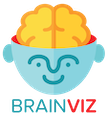Reduce the uncertainty of treating depression
What is BrainViz?
- Prescribing medication to patients with uncertain diagnosis is hard. Determining whether someone has unipolar or bipolar depression and what medication will make them better can be a long process of trial and error.
- We offer a tool that analyzes the brain network of a patient and determines if they are more like those who have responded well to mood stabilizers or antidepressants.
- Your expertise as a psychiatrist and your relationship with your patient are key to treating your patients. We add another piece of evidence to consider when making a diagnosis and prescribing medication.
How it works
- You order the test for a patient
- We perform a resting fMRI scan and process the data to look at the patient’s brain network activity.
- We compare the patient’s brain network activity to the activity of cohorts of patients who responded well to anti-depressants and mood stabilizers and tell you how similar your patient’s brain is to each group.
- You use this information as a piece of evidence in making your treatment decisions.
Disclaimer
This product is currently not approved by the FDA. This site is for demonstration purposes only. If you log in, you can upload a scan and receive results. However, these results should not be used for any other purposes, including medical and diagnostic purposes.
We make no representations or warranties in relation to this site or the information and materials therein.
We do not accept responsibility for any loss or damage however caused including, without limitation, any indirect or consequential loss or damage arising from in connection with the use of this website.
Contact us!
If you want to learn more about our technology or collaborate with us, please contact us.
About Us
Joint GSU, Georgia Tech, and Emory Center for Translational Research in Neuroimaging and Data Science (TReNDS)
Address: 55 Park Pl NE, Atlanta, GA 30303
Email: info@trendscenter.org
Our Approach
TReNDS is focused on developing, applying and sharing advanced analytic approaches and neuroinformatics tools that leverage advanced brain imaging and omics data, with a goal of translating these approaches into biomarkersthat can help address relevant areas of brain health and disease. Large scale data sharing and multimodal data fusion techniques are the underpinnings of our approach.





